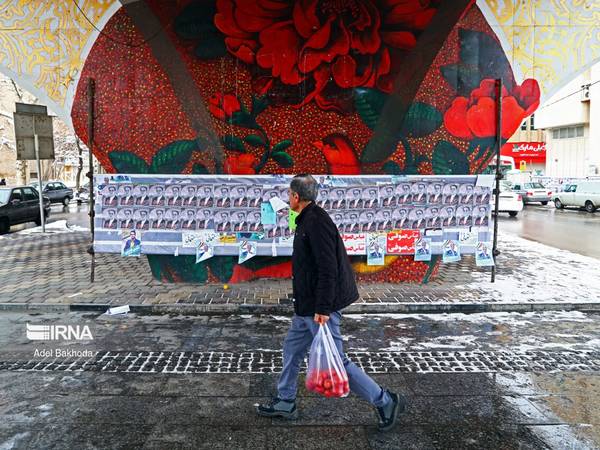Iran's state media and officials paint a picture of enthusiastic voter turnout in elections on Friday, yet social media accounts offer a contrasting narrative through videos and images.
The election headquarters extended the polling hours three times, two hours each time until midnight, instead of the initial closing time at 6:00 pm. This tactic to show a high turnout and busy polling stations was also used in previous elections.
Spokesman of the Guardian Council, Hadi Tahan-Nazif, told reporters in the early hours of the evening that turnout had already surpassed the previous elections in 2020. He avoided answering reporters’ questions about the number of ballots distributed to the polling stations which could provide a preliminary estimate of the turnout.
The regime appears to be deeply concerned about low turnout because officials, including Supreme Leader Ali Khamenei, have always boasted that higher turnout in Iranian elections in comparison with some Western countries was proof of the Islamic Republic’s legitimacy and popularity with its citizens.
Photos showing a deserted polling station in the Kurdish city of Boukan.
In the past two weeks, many clergymen and regime politicians came out urging people to vote, spreading fear that a low turnout can endanger the country’s security and make governance even worse than what it has been in recent years.
Khamenei cast his vote a few minutes after the opening of the polls and made a speech in which he told voters to head to the polls and vote as early as possible. “Pay attention to this: Make friends happy and disappoint the ill-wishers,” he said while stressing that the eyes of the world, both friends and enemies, were on the Iranian elections.
Local authorities in some provinces and cities such as Lorestan, Kordestan, and Mashhad announced partial turnout figures in the afternoon. In Lorestan a local official claimed that 10 percent of the voters had cast their votes by 4:00 PM local time. For Kordestan, the turnout was said to be 25 percent by 7:00 PM. Even these official figures seem low, given a trend that regime loyalists usually vote early in the day.
A polling station at 10:00 AM in the religious city of Qom
According to the governor of Mashhad, which is the country’s second largest city, 33 percent of the eligible voters had already voted by around 4:00 PM local time. He said in the previous parliamentary elections in 2020 turnout was 33 percent so this time it is going to be higher when the polls close.
The religious city of Mashhad is a major stronghold of hardliners where turnout is usually much higher than in the capital Tehran.
An empty polling station in Qasr-e Qand in Sistan and Baluchestan province
But local officials were later warned not to announce any figures before the completion of the elections and to leave such announcements to the election headquarters.
Videos and photos posted from across the country on social media or sent to Iran International TV, however, show much fewer people, or even none, at the polls. Many social media users have jokingly compared the sparse queues and rather deserted polling stations with the queues at nearby restaurants and cashpoints where more people could be seen on Friday.
They also claim that the state television is using photos and footage from the previous elections as “live” material and have identified some photos of voters and queues used by the state media that belong to four years ago.
The photo on the left was taken in the elections of 2020 in the Kurdish city of Sanandaj as seen from the picture on the right.
Statements by some officials also suggest that despite the government propaganda, turnout fell far shorter than what authorities expected or hoped for.
“I invite all those who have trusted and voted for me and the main list of the Revolutionary Front, to increase their participation, to contact their friends or acquaintances right now and convince them to participate in the elections. It is not important just to win the elections, increasing participation is a priority,” Parliament Speaker Mohammad-Bagher Ghalibaf tweeted several hours after the polls opened.
